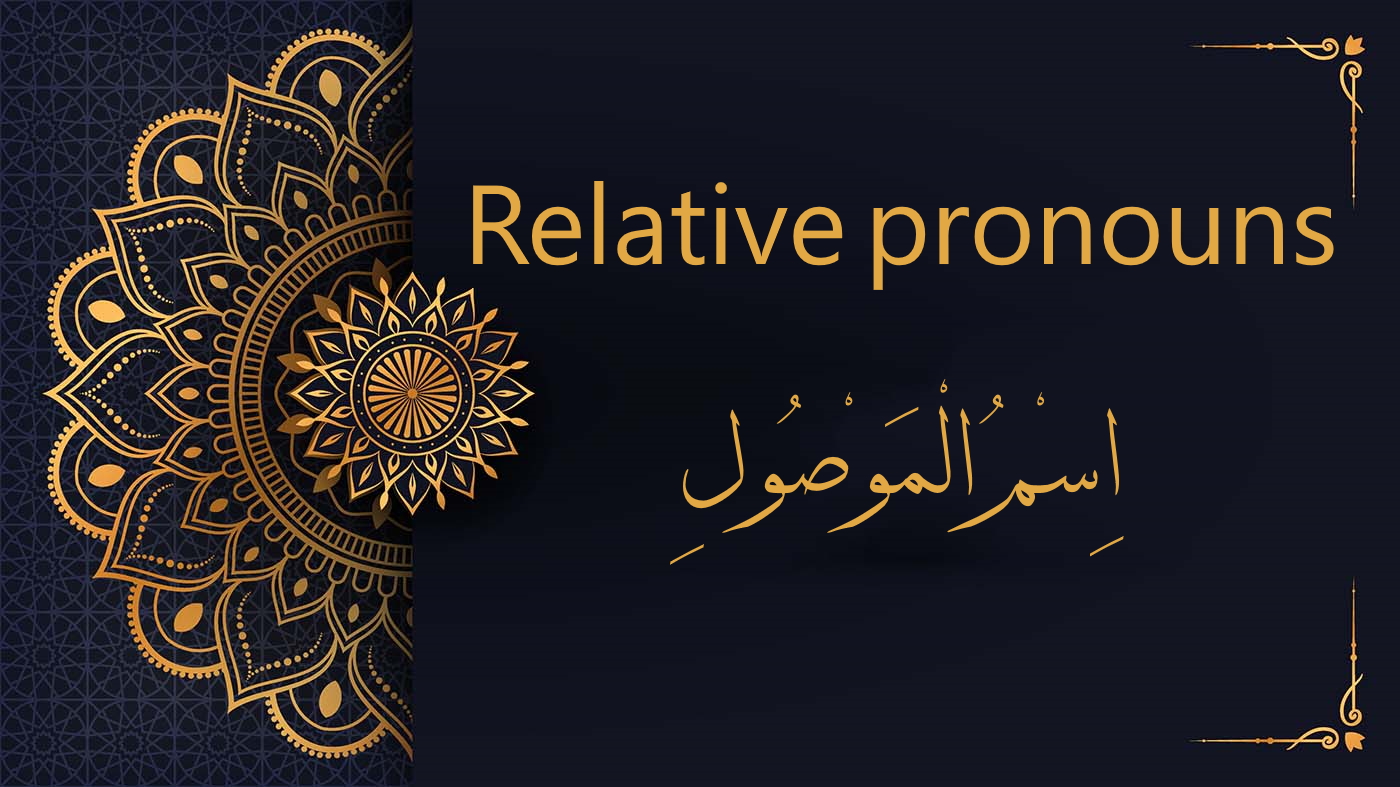
Relative pronouns serve as connectors in sentences, referencing words that appear either before or after them. While they specify particular entities or ideas, on their own, they do not convey a complete thought. Their primary function is to bridge elements together, ensuring clarity and cohesion in language expression.
Singular
اَلَّذِي
That one who/ that one which
Dual
اَلَّذَيْنِ – اَلَّذَانِ
Those two who/ those two which
Plural
اَلَّذِيْنَ
Those all who/ That who/ Those which
Singular
اَلّتِيْ
That one who/ that one which
Dual
اَلَّتَيْنِ – اَلَّتَانِ
Those two who/ those two which
آلائِي
Those all who/ That who/ Those which
The subsequent phrase that accompanies the relative pronoun is termed: اَلصِّلَةُ.
This phrase complements and clarifies the meaning initiated by the relative pronoun.
If the relative pronoun alludes to any component of the اَلصِّلَةُ other than the subject, it necessitates reinforcement with an affixed pronoun known as: عَائِدٌ or رَاجِعٌ.
For example:
فَاتَّقُوا النَّارَ الَّتِي وَقُودُهَا النَّاسُ وَالْحِجَارَةُ ۖ أُعِدَّتْ لِلْكَافِرِينَ
then fear the Fire, whose fuel is men and stones, prepared for the disbelievers. (2:24)
النَّاسُ وَالْحِجَارَةُ = صِلة
وَقُودُهَا = راجِعٌ
الَّتِي = relative pronoun
Illustrations used in the Holy Quran
وَلَوْ قَاتَلَكُمُ الَّذِينَ كَفَرُوا لَوَلَّوُا الْأَدْبَارَ
And if those [Makkans] who disbelieve had fought you, they would have turned their backs [in flight]. (48:22)
الَّذِينَ آمَنُوا وَعَمِلُوا الصَّالِحَاتِ
Those who have believed and done righteous deeds (13:29)
وَاللَّذَانِ يَأْتِيَانِهَا مِنكُمْ
And the two who commit it among you (4:16)
وَلَا تَسْتَوِي الْحَسَنَةُ وَلَا السَّيِّئَةُ ۚ ادْفَعْ بِالَّتِي هِيَ أَحْسَنُ فَإِذَا الَّذِي بَيْنَكَ وَبَيْنَهُ عَدَاوَةٌ كَأَنَّهُ وَلِيٌّ حَمِيمٌ
And not equal are the good deed and the bad. Repel [evil] by that [deed] which is better, and thereupon the one whom between you and him is enmity [will become] as though he was a devoted friend. (41:34)
وَاللَّاتِي يَأْتِينَ الْفَاحِشَةَ مِن نِّسَائِكُمْ
Those who commit unlawful sexual intercourse of your women(4:15)
وَاللَّائِي يَئِسْنَ مِنَ الْمَحِيضِ
And those who no longer expect menstruation among your women (65:4)
إِنْ أُمَّهَاتُهُمْ إِلَّا اللَّائِي وَلَدْنَهُمْ
Their mothers are none but those who gave birth to them (58:2)
In Arabic, مَنْ (meaning “who” or “whoever”) and مَا (meaning “what” or “whatever”) serve as relative pronouns. While مَنْ is reserved for living entities, مَا is employed for inanimate objects.
Examples:
وَمِنَ النَّاسِ مَن يُجَادِلُ فِي اللَّـهِ بِغَيْرِ عِلْمٍ
And of the people is he who disputes about Allah without knowledge (22:3)
يَدْعُو لَمَن ضَرُّهُ أَقْرَبُ مِن نَّفْعِهِ ۚ لَبِئْسَ الْمَوْلَىٰ وَلَبِئْسَ الْعَشِيرُ
He invokes one whose harm is closer than his benefit – how wretched the protector and how wretched the associate. (22:13)
مَا عِندَكُمْ يَنفَدُ ۖ وَمَا عِندَ اللَّـهِ بَاقٍ ۗ وَلَنَجْزِيَنَّ الَّذِينَ صَبَرُوا أَجْرَهُم بِأَحْسَنِ مَا كَانُوا يَعْمَلُونَ
Whatever you have will end, but what Allah has is lasting. And We will surely give patients their reward according to the best of what they used to do. (16:96)
This lesson on Arabic nuances concludes here. Insha’Allah, our subsequent session will delve into the interrogative pronouns.
Al-dirassa Institute invites you on a linguistic journey with our expert teachers to master the Arabic language. Should you wish to further your studies, we welcome your inquiries.
Discover the experiences of our delighted clients who have thoroughly enjoyed utilizing this standout feature.
Alhamdulillah I‘m very pleased with the arabic and Qur’an lessons I receive from teacher Umm Tasneem and I‘m also content with the al-dirassa administration team who were very quick in answering any questions I had. In a month I progressed a lot and I cannot wait to continue my studies with al-dirassa. May Allah reward everyone at al-dirassa.
Verified review - view original
My Qur’an teacher is fantastic, she teaches me in a loving and kind way where I look forward to the lessons and learn so much. My Arabic teacher is equally as nice and has a lot of patience with me, she has great expertise in the field and I’ve progressed really quickly with her. Thank you Al-dirassa!
Verified review - view original
Don’t want to go through the translation anymore?
30 free minutes with your qualified Egyptian teacher.

Al-dirassa Institute offers you a gift to help you begin your journey to being fluent in Arabic and learning the Quran.

Al-dirassa Institute offers you a gift to help you begin your journey to being fluent in Arabic and learning the Quran.